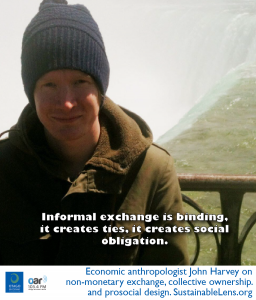Informal exchange is binding, it creates ties, it creates social obligation.
John Harvey is a researcher at the Horizon Digital Economy Research Institute at the University of Nottingham. An economic anthropologist, John is researching systems to encourage non-monetary forms of exchange such as freecycle, couch surfing and his own Neehoy. He talks with us here about prosociality and empathy as core design strategies.
Talking points
As much time, effort and inter-personal meaning goes into the informal economy
There are two fundamentally different ways people come at understanding the economy. There’s the formalist approach – the idea that we’re all rational people, and that we rationalise, economise in the presence of scarce resources, and the opposite side to that – the substantivist approach would argue that neither of those presuppositions are true the idea of rationality is not universal and the idea of scarcity is not universal – they are constructs. The formalists might say the economy is the aggregate of all individual actions, whereas the substantives may say the economy is simply the way that people provision and furnish for themselves – they not might be trying to maximise utility.
There’s always been this sense of alienation when it comes to exchange. You might consider some people you talk to the same as yourself – you might give or share with them readily, or some people you might consider as other – you might want some balanced exchange.
Alienation refers to the objects in our lives – the idea that some objects are transferable, and some objects are not transferable – we keep them within our kin, our friends, our family. Some items assume a collective ownership – the food in the fridge. That comes from a shared mutual understanding of who we are. Introducing otherness introduces the notion of debt.
New technology is changing the way we look at things – we can belong to multiple communities online that we wouldn’t necessarily interact with otherwise…this is changes the dynamics of how we procure things for our own lives.
(Couch-surfing, wikipedia, creative commons) These new forms of collective ownership are fascinating.
We should be designing economic policy that helps people to feel well-being rather than increased GDP.
I think GDP is a terrible measure of prosperity
The free market…has helped to liberate people, but potentially it imprisons them in an iron cage of consumption.
Efficiency is a good thing…the less damage we can do to the planet, the less resources we can extract the better. Efficiency as it relates to production starts to become controversial – as you put efficient tools into the hands of a few, you reduce the workforce.
Centralising production…full of conundrums…
We’re (Neehoy) expanding the ideas of free-cycle to large scale asset management.
Most of the focus in asset management has been on high value assets, but this overlooks the millions of pounds tied up in furniture. In health, much of this is dormant, sat idle, if we can reduce this by a fraction then not only is the organisation saving money, it’s also a great thing for the environment.
Prosociality means to me a voluntary intentional behaviour that results in benefits for another.
In rational economics this is explained by the utilitarian self – if you act in a way that is kind to other people, you have a warm glow – you feel good about yourself – you’ll feel good and that’s why you do it it’s selfish. Similarly they’ll say when you see somebody in distress you’ll feel negative, you’ll feel guilt. Acting kindly is helping to relieve that sense of guilt. Alternatively to that utilitarian concept of altruism, that egoistic interpretation, are ideas about empathic concern – the ability to imagine the other. What other people endure and perceive in their own lives.
We see these rational behavioural economic assumptions in design. Recently we’ve seen a lot of work that attempts to nudge behaviour, it takes an individual to be at best to be rational and at worst to be irrational but within confines – bounded rationality. …HCI is well positioned to present information, cues to try to manipulate behaviour, but it is fraught.
Activist: HCI an interventionary field, we don’t just describe the world, we try to change it – it is inescapably an activist discipline. There is a moral obligation of HCI researchers to consider impacts.
I’m naturally anarchistic – I like decentralisation, I like giving tools to people so that they can do something meaningful with their life. Unless those tools are created in participation with local cultures you run the risk of cultural imperialism.
I like the idea that technology can help people to become kinder, freer.
I celebrating differences rather than looking for universal principles.
Streetbank: a small charity, encouraging people to act more kinder to other people that doesn’t rely on reciprocity – I think that is a beautiful thought.
Pay-it-forward still has notion of money that involves debt, the moral stance of obligation, I like play, play-it-forward. Could you create an economic based on these Utopian principles? Not likely to happen but a nice thought.
We need both sides of the economy, there needs to a redress of the balance between those two sides.
Advice: Be willing to fail. Don’t take failure as end of the road – there’s so much to learn from failure it is almost virtuous.

